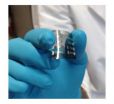(Press-News.org) So-called animal-assisted therapy is being used increasingly often to treat physical and mental diseases in man. "For stressed persons, animals may serve as "social ice-breakers" and thus motivate them to enroll in therapy in the first place," says Lisa Maria Glenk, the lead author of the study. Scientific investigations on animal-assisted therapy do exist, but these have been largely confined to studying the effects of such therapy on man.
Lisa Maria Glenk conducts research at the Department of Comparative Medicine at Messerli Research Institute. She is a pioneer in the research of animal perspectives in animal-assisted therapy with dogs. Together with colleagues at the University of Vienna and the Karl Landsteiner Institute of Neurochemistry, Neuropharmacology, Neurorehabilitation and Pain Treatment in Mauer-Amstetten, Glenk investigated the quality of life of the four-legged co-therapists. "We lack widely applicable standards for professional use of animals in therapy. We wish to establish these standards. When animals are subjected to stress during work, it may have negative consequences on their psychological and physical health. When the animals are safe, it eventually benefits human beings as well", says the natural scientist Glenk.
No stress in group therapy
Trained therapy dogs are not subjected to greater stress during therapy than they are on their "days off from work". For this purpose Glenk investigated five trained and experienced therapy dogs. The dogs were regularly present during group therapy with drug-addicted persons and two therapists. Glenk used saliva samples to determine whether the therapy periods were stressful for the animals. In saliva samples taken from the dogs at various time points during and after group therapy, as well as at various time points during their leisure time, the scientists found cortisol, which is an indicator of stress levels in dogs. The scientists also documented the behavior of the dogs on video film.
Freedom relaxes
The results provide important data, says Glenk: "Therapy dogs are not subjected to stress during this type of therapy work." In a previous study Glenk had shown that therapy dogs that operate without a leash have lower cortisol levels. Accordingly, leashed dogs involved in animal-assisted therapy with psychiatric patients are less relaxed than those who can move freely while in action.
"Thus, it depends on whether the dogs can move freely, i.e. whether they are not on a leash and are permitted to leave the room at any time. These conditions were present during the group therapy. The dogs could also drink at any time and could move freely in the room," says Glenk.
Symptoms of stressed dogs
When therapy dogs feel uncertain or overwhelmed, they may develop symptoms like hair loss, scaling, biting the leash, shaking the body, yawning, licking their lips, panting, or diarrhea. More subtle abnormalities include refusal to eat, avoidance of eye contact with humans, or reduced attention and concentration abilities. Dog owners should take acute stress signals during therapy seriously and should remove their dogs from the respective situation.
Glenk recommends regular "supervision" for therapy dogs. People in psychosocial professions are accustomed to supervision as a mental hygiene measure during which difficult experiences can be processed. With supervision of animals, veterinary medicine specialists skilled in behavior research would be able to detect individual abnormalities early in therapy dogs.
INFORMATION:
The article "Salivary cortisol and behavior in therapy dogs during animal-assisted interventions: A pilot study" by Lisa Maria Glenk, Oswald David Kothgassner, Birgit Ursula Stetina, Rupert Palme, Berthold Kepplinger and Halina Baran was published in the Journal of Veterinary Behavior.
http://dx.doi.org/10.1016/j.jveb.2014.02.005
About the University of Veterinary Medicine, Vienna
The University of Veterinary Medicine, Vienna is the only academic and research institution in Austria that focuses on the veterinary sciences. About 1,200 employees and 2,300 students work on the campus in the north of Vienna which also houses five university clinics and various research sites. Outside of Vienna the university operates Teaching and Research Farms. http://www.vetmeduni.ac.at
Scientific Contact:
Dr. Lisa Maria Glenk
Messerli Research Institute, Comparative Medicine
University of Veterinary Medicine Vienna (Vetmeduni Vienna)
T +43 1 25077-2665
lisa.glenk@vetmeduni.ac.at
Released by:
Susanna Kautschitsch
Science Communication / Public Relations
University of Veterinary Medicine Vienna (Vetmeduni Vienna)
T +43 1 25077-1153
susanna.kautschitsch@vetmeduni.ac.at
Stress research in therapy dogs reveals animals' needs
2014-04-29
ELSE PRESS RELEASES FROM THIS DATE:
Drug monitoring information improves regimen adherence, Carnegie Mellon researchers say
2014-04-29
PITTSBURGH—Most people want to take mediations as prescribed, even if they sometimes need a little help remembering. For them, an automated system that monitors drug taking and provides feedback after the fact may be more useful than one that nags people when it is time to take a pill, researchers at Carnegie Mellon University say.
In a 10-month study of such a system in the homes of older adults with chronic health problems, the researchers found that adherence to a medication regimen improved when people had ready access to a digital display of their medication-taking ...
'Race, risk and behaviors: A type 2 diabetes update'
2014-04-29
Philadelphia, April 29, 2014 – Clinical Therapeutics features a special report in its April issue focusing primarily on the behavioral issues associated with patients' self-management of type 2 diabetes. "Diabetes, perhaps more so than any other chronic disease, requires people to significantly modify their behaviors—sometimes in ways that are contrary to their cultural norms and backgrounds—even when they don't 'feel' sick or experience symptoms of the disease," said John G. Ryan, Dr.PH., Topic Editor for Endocrinology and Diabetes, and guest editor for the April 2014 ...
Facial transplantation: Almost a decade out, surgeons prepare for burgeoning demand
2014-04-29
Plastic and reconstructive surgeons leading the first retrospective study of all known facial transplants worldwide conclude that the procedure is relatively safe, increasingly feasible, and a clear life-changer that can and should be offered to far more carefully selected patients.
Reporting in The Lancet online April 27, NYU Langone plastic and reconstructive surgeon and senior author Eduardo Rodriguez, MD, DDS, says results after nearly a decade of experience with what he calls the "Mount Everest" of medical-surgical treatments are "highly encouraging."
The review ...
Stroke risk reduced if brain blood vessel disorder is left alone
2014-04-29
Treating patients who suffer from a common condition that affects blood vessels in the brain increases their risk of stroke, a study has found.
People with a condition known as arteriovenous malformation (AVM) – which causes blood vessels in the brain to tangle – have a better outcome if doctors treat their symptoms only and not the AVM.
A team of doctors looked at the long-term outcome of patients with the condition, which is caused by abnormal connections between the arteries and veins in the brain.
They found that, over a 12 year period, patients who chose not ...
In a commanding position -- and now cheaper
2014-04-29
It is a requirement of the touchscreens for all our everyday gadgets that they are transparent and at the same time electrically conductive. Solar cells are also unable to operate without such a film, which allows sunlight to pass through it, but can also conduct the current generated. Conventional "transparent conductive oxide" (TCO) films consist of a mixture of indium and tin oxide. Indium in very much in demand in the electronics industry, but is rare, and therefore expensive.
A cheaper option (at least in terms of the materials used) employs zinc oxide mixed with ...
Study highlights importance of parents talking to kids about money
2014-04-29
A new study from North Carolina State University and the University of Texas finds that children pay close attention to issues related to money, and that parents should make an effort to talk with their children to ensure that kids don't develop misconceptions about finance.
"We wanted to know what kids are learning, or not learning, about money from their parents," says Dr. Lynsey Romo, an assistant professor of communication at NC State and lead author of a paper on the research. "This is one of the first studies to look at what young school-age children know about ...
Man landing on Madeira could be 4 centuries prior to its colonization by the Portuguese
2014-04-29
VIDEO:
Four centuries before its colonization by the Portuguese, man may have landed on Madeira Island. This can be deduced from a study led by the Spanish National Research Council (CSIC),...
Click here for more information.
According to the results, published in the Proceedings of the Royal Society B journal, house mice may have landed on the island before 1036, most likely transported by a ship. The article suggests that the introduction of this species would result in an ...
Immunology touted as next big thing for popular science
2014-04-29
A University of Manchester professor says scientific jargon could be making the science of the human immune system a turn-off for the general public.
Professor Daniel Davis says that scientists are using a number of innovative ways to generate public discussion on immunology and the time is right for people to get to grips with the subject.
His paper, published today in Nature Reviews Immunology, coincides with the International Day of Immunology, argues that now is the right time for immunology to become the next big trend in popular science – to inform new discussions ...
Nutrition experts chew the fat at ASN satellite symposium
2014-04-29
(San Diego, CA) April 25, 2014 – More research is needed to better understand the important role that dietary fats play in optimal health, said a panel of leading food and nutrition scientists Friday at an American Society for Nutrition (ASN) pre-annual meeting session.
More than 130 academic and industry food and nutrition scientists and registered dietitians attended the half-day ASN Satellite Symposium: Let's Chew the Fat: Current Thinking on Dietary Fats and the Food We Eat, held from 1-5 pm at the San Diego Bayfront Hilton in conjunction with the ASN's 78th Scientific ...
Adhesion molecule shows promise for treating colitis
2014-04-29
Philadelphia, PA, April 28, 2014 – The adhesion molecule CD146 plays a vital role in inflammation and offers a promising therapeutic target for treating inflammatory bowel disease (IBD) as well as preventing colitis-associated colorectal cancer, say scientists. Targeting CD146 with anti-CD146 antibody AA98, especially in combination with an anti-TNF-alpha antibody, showed promising results in mice. Their report is published in The American Journal of Pathology.
Enhanced CD146 expression has been reported on endothelial cells in intestinal biopsies from patients with inflammatory ...


